Graham Reid | | 5 min read
Wailing Souls with Sly'n'Robbie: Old Broom (from the album Sly and Robbie Present Taxi, 1981)
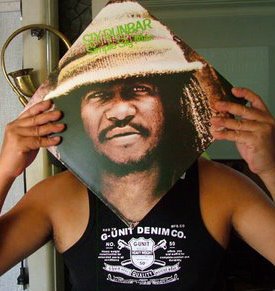
Silly question maybe, but you have to
start by asking drummer Sly Dunbar -- one half of the legendary
Sly'n'Robbie rhythm section alongside bassist Robbie Shakespeare --
what he's been up to lately.
In the past couple of years the
formidable Riddum Twins have played on No Doubt's career-reviving
Rock Steady album, shared equal billing on an album with
Jamaican-born jazz pianist Monty Alexander, have worked with
ghetto-rapper Bounty Killer and apparently have a recorded an album
of Led Zepp tunes. Inna reggae style, of course.
Before that Sly'n'Robbie could tick off
studio sessions with Bob Marley, Bob Dylan, four years touring and
recording with Peter Tosh, placing the crucial backdrop behind
Anglo-American reggae trio Black Uhuru on three devastating albums in
the Eighties, and taking Grace Jones on to the charts with Pull Up to
the Bumper. They've moved effortlessly from Sixties ska through
classic Seventies reggae to dancehall, ragga and now into
drum'n'bass.
They slip from acoustic roots to
digital electronics with as much effort as you get into bed.
So what's Sly been up to today in
London? It almost sounds mundane when put against his 35-year history
which dates back to a session as a 16-year-old with Dave Barker and
Ansell Collins on what became the ska classic Double Barrell.
"Oh, we just been in the studio
with the Mad Professor for an album and we laid about a third of the
rhythms tracks down now. You try and make yourself busy so you don't
get lazy," he laughs.
"We don't turn down too much work
because we are from a small country, which is reggae, and need to get
as many people as possible involved in it. Sometime we do have to
choose between things but we always respect a job when it comes in
because it help spread the word."
Sly'n'Robbie have more than spread the
word, they have made a musical Esperanto, whether it be deep with
Black Uhuru or as sharp as Sly's techno-beats on the '83
breakthrough-scratching album Future Shock with Herbie Hancock.
Yet as musically curious and
progressive as Sly is, he reflects on Seventies reggae when Bob
Marley, Peter Tosh, Burning Spear and others were carrying the banner
of righteous Rastafarianism and finding an international audience.
"We were talking about that today.
Back then there was so much music we were listening to when we were
going to parties, and you can easy flip an idea from an old song and
make it new. Like the Motown, Philadelphia and Stax stuff.
"Today we were playing some reggae
records and saying we need to move forward and were thinking about
hip-hop which has grown. I don't think there's that growth in reggae
now."
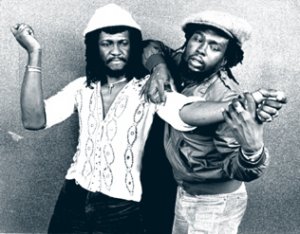 He accepts the irony that for many
young musicians, raised in hip-hop culture where reggae rhythms are
simply part of the mix, their way forward has been to go back to what
he and Robbie were doing back then. They have embraced Jamaican dub
styles and an almost prehistoric drum'n'bass style.
He accepts the irony that for many
young musicians, raised in hip-hop culture where reggae rhythms are
simply part of the mix, their way forward has been to go back to what
he and Robbie were doing back then. They have embraced Jamaican dub
styles and an almost prehistoric drum'n'bass style.
He says they weren't surprised when
rapid-fire British drum'n'bass came along: "What I liked was
they took it to another level. A lot of people who listened to the
original Jamaican drum'n'bass didn't change it and still follow it.
Ours is slightly different from theirs which is more electronic, but
it's good.
"There is a move back to an older
style though, back to real instruments."
Sly reflects on his early career when,
growing up in Kingston, he would make a drumkit out of tin cans. His
first group was the Yardbrooms at age 15, but a year later he was
with singer Barker and keyboard player Collins for the album Double
Barrell, the title track of which has appeared on dozens of
compilations since.
After time with toaster U Roy and vocal
trio the Mighty Diamonds, it was at a Seventies session in Bunny Lee's
studio he met bassist Shakespeare. The two clicked, within four years
had their own Taxi label and went into production while still playing
with Marley, Burning Spear and Jimmy Cliff. In 76 they played on
Peter Tosh's Legalise It album and for four years toured with him.
"I think Peter's were great
recordings but haven't been remarketed and promoted the way they
should. But a lot of people love Peter. Today we were talking about
the song he did Nothing But Love [on Wanted, Dread and Alive] and
Michael Rose [of Black Uhuru with whom they currently tour] said it
was his favourite song. We really admire Peter and had some wicked
rhythms there."
In 1980 Sly'n'Robbie left Tosh to go
tour with Black Uhuru, and they subsequently produced and played on
their seminal albums Red, Black Sounds of Freedom and Sinsemilla.
"We had been producing them and
went on the road because Chris Blackwell of Island wanted them to go
out, but we couldn't think of a band for them. Nobody really
understood what we were playing and so we couldn't let other people
present it and it not work."
The Riddum Twins were much in demand
after Grace Jones' 81 Nightclubbing album which featured a huge hit.
"She helped launch us in the
international marketplace when we did Pull Up to the Bumper. The
timing was right for her and for Robbie and myself. It was a launch
for bringing Jamaican music and a Jamaican artist into the front
line."
His best memories are of those great
Jamaican artists like Tosh, Burning Spear ("You can't mistake a
Burning Spear song. He has held his own from the first. The
Godfather") and Marley.
"I have one memory of Bob, when he
came back from exile and came back to Jamaica. I saw Scratch [Lee
Perry] and he want to cut some song with Bob, so we went to Black Ark
studio. Scratch was saying he want me to play a one-drop and as I was
turning away Bob look at me and smile and say, 'Don't play one-drop,
play what I play like my straight four thing' because that's what he
wanted to sing over.
"I said, 'Okay Bob' and Scratch,
he know. But you know, I don't remember the name of that song,"
he laughs.
"But I did play on Punky Reggae
Party in the studio. I overdubbed the drums because it was originally
cut in London and they came down to Jamaica and want a different
feel. So I did that."
And so very much more Mr Dunbar.
There is much more on reggae at Elsewhere here.

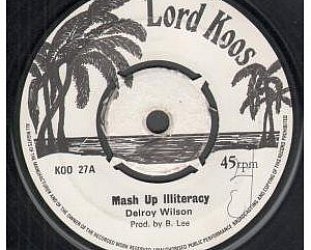
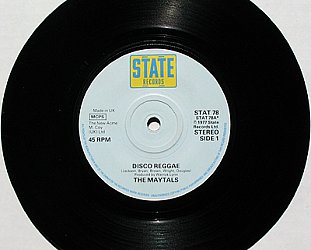

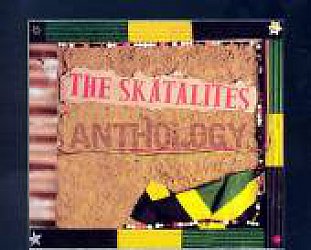
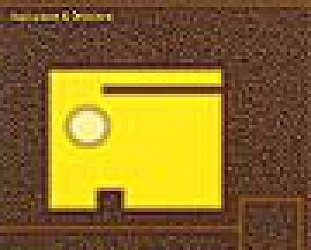
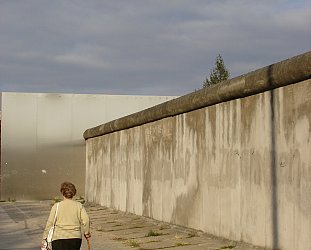
post a comment